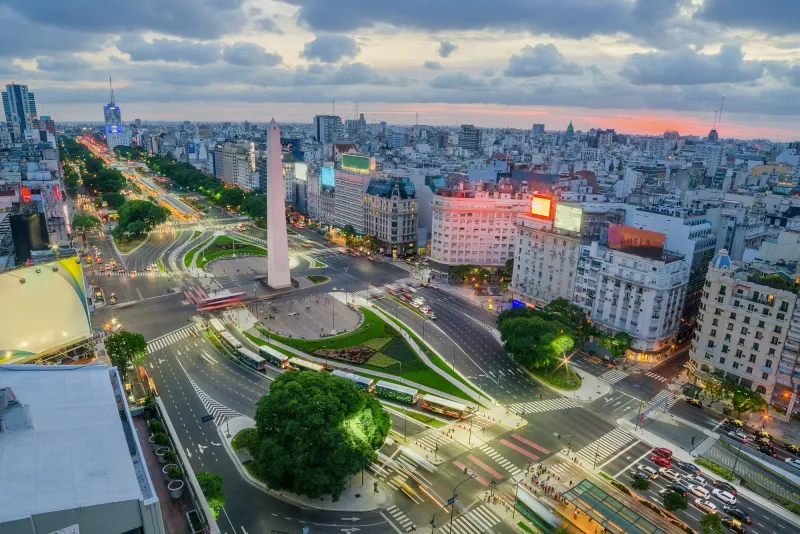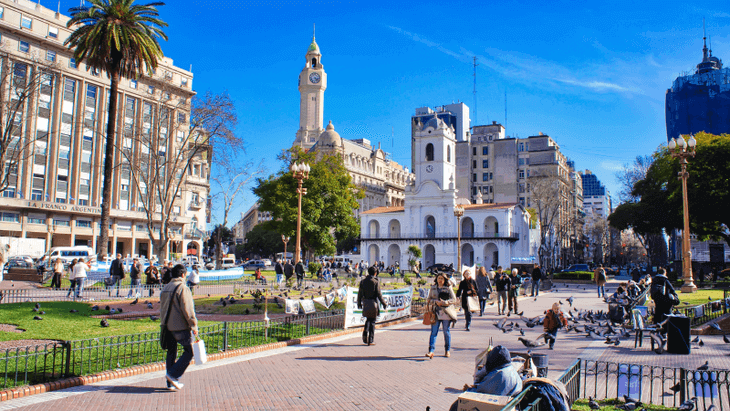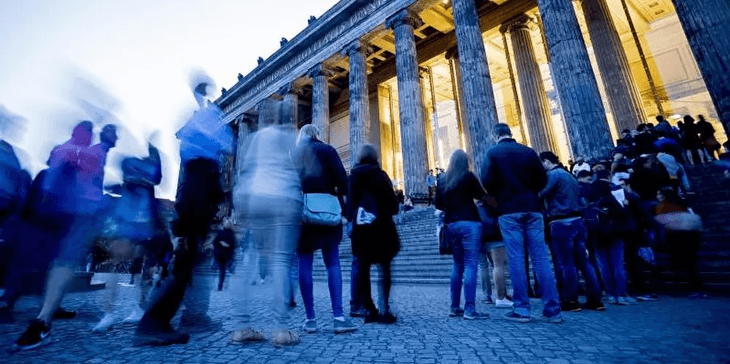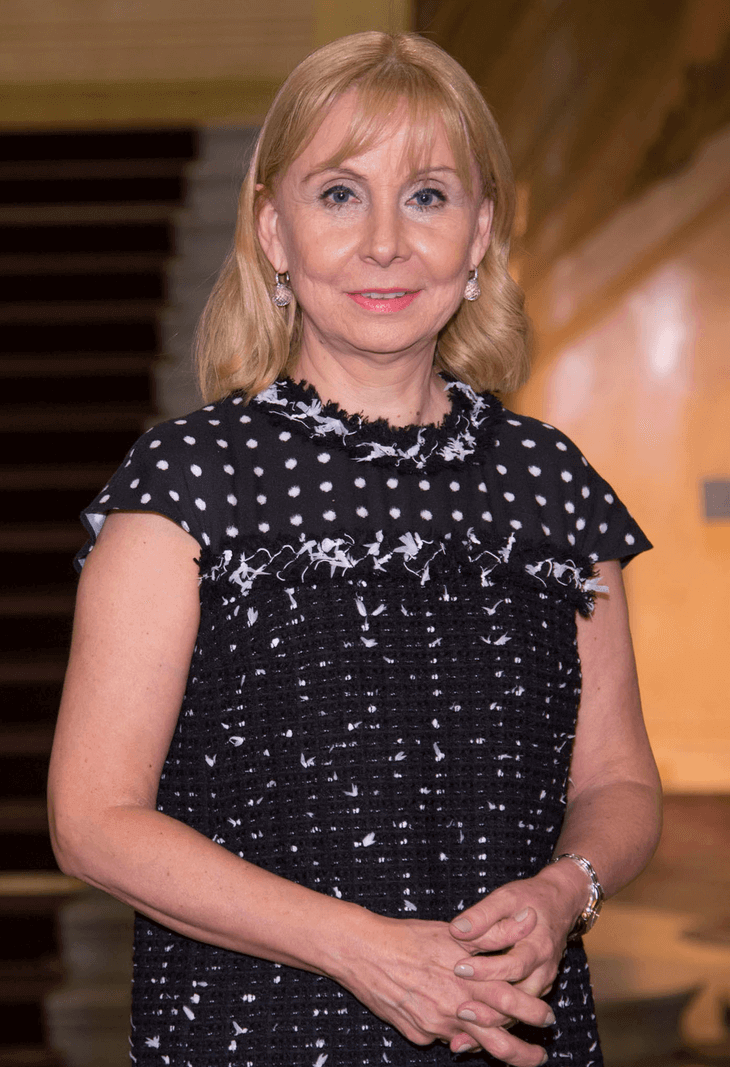“Transnational cultural cooperation not only enriches the cultural life of cities, but can also be a powerful catalyst for sustainable urban development."
USE:POSITIONS with María Victoria Alcaraz

As part of our use positions series, we interviewed María Victoria Alcaraz, Director of Cultural Cooperation at Buenos Aires’ Ministry of Culture. María Victoria Alcaraz shared insights on city twinning initiatives, highlighting their role in fostering cultural exchange and strengthening international urban relationships, with a focus on Buenos Aires' partnership with Berlin.
Who are you and what do you do?
I am María Victoria Alcaraz, a professional committed to the world of art and culture. My career has unfolded mainly in the field of cultural management and public administration, where I have had the opportunity to contribute to the enrichment and dissemination of heritage and cultural management for the City of Buenos Aires.
I am currently working as Director of Cultural Cooperation at the Ministry of Culture for the City of Buenos Aires. In this role, my duties are to implement programs that promote cultural collaboration and the dissemination of the creativity in our city, both locally and internationally. My work focuses on establishing strategic alliances with various cultural institutions, government and non-governmental organisations, to foster cultural exchange, develop joint projects and promote talent and creativity in Buenos Aires.
With an integrative vision, I seek to build bridges between different fields and promote mutual understanding. My personal focus is to support initiatives that promote cultural diversity and ensure equitable access to artistic manifestations, contributing to the cultural development of the city and its citizens.
This year, Berlin and Buenos Aires celebrate the 30th anniversary of their twinning. What role does culture play in the formation and management of city twinning in general, and in the partnership between Berlin and Buenos Aires in particular?
City twinning is a powerful tool for strengthening international relations and promoting mutual understanding between different cultures. This year, Berlin and Buenos Aires celebrate the 30th anniversary of their twinning, a bond that has served to strengthen ties between two vibrant and diverse metropolises. Culture plays a fundamental role in forming and maintaining these partnerships, acting as a bridge that connects people across geographical borders.
Culture is essential for city twining in several respects:
- Promoting of Mutual Understanding: Culture facilitates the exchange of knowledge and experiences between the twinned cities. Through cultural events, expositions, festivals and exchange programs, citizens have the opportunity to learn about traditions, customs and values of their international counterparts.
- Strengthening of Local Identity and Pride: Cultural twinning helps cities to highlight and celebrate their own identities. As they share their cultural heritage with the world, the cities strengthen the sense of belonging and the pride among their inhabitants.
- Development of Cultural Diplomacy: Culture serves as an important form of diplomacy, creating relationships based on mutual respect and admiration. This type of diplomacy can be especially effective in overcoming political barriers and promoting peace and international cooperation.
- Tourism and Local Economy Enhancement: Cultural exchanges and twinning-related events attract tourists and encourage trade. This not only benefits local economies, but also generates opportunities for creative and cultural industries of both cities.
Culture has been an essential pillar of the twinning relationship between Berlin and Buenos Aires since its beginning. For over 30 years, the two cities have collaborated on a wide range of cultural activities, enriching both cities, including:
- Artistic and Educational Exchanges: through artistic residencies, student exchange programs and collaborations between cultural institutions, Berlin and Buenos Aires have promoted a constant flow of ideas and talents among their citizens. This has allowed artists, academics and students to experience and learn from different cultural contexts.
- Joint Cultural Events: Both cities have organized and participated in numerous joint cultural events, including film festivals, art exhibitions, concerts and seminars. These events not only celebrate cultural diversity, but also provide a space for dialogue and cooperation.
- Collaboration on Heritage Projects: The preservation of historical and cultural heritage is a shared interest. Joint restoration and conservation projects have allowed both cities to share technical expertise and best practices in this area.
Culture has been and continues to be a vital component in forming and maintaining the partnership between Berlin and Buenos Aires. This bond has not only enriched both cities culturally, but also has strengthened their ties of friendship and cooperation, proving how the power of cultural exchange can transcend borders and unite people in a common purpose.

Do you have examples that illustrate how the international cooperation of cities has shaped local culture in Buenos Aires?
Buenos Aires is a city at the end of the world. Perhaps for this reason, we have a desire to get to know and interact with other cities, other cultural productions that allow us to strengthen and enrich Buenos Aires’ own cultural production. International cooperation between cities has had a significant impact on the local culture of Buenos Aires, facilitating cultural exchanges that enrich the artistic scene and promote cultural diversity.
Here are some outstanding examples:
- Buenos Aires has established cultural twinnings with cities in different parts of the world, including Paris, Madrid, Barcelona and New York. These agreements facilitate artists exchange, exhibitions and cultural events that promote mutual understanding and the dissemination of local and international artistic practices.
- The city participates in and organizes international film, music, theater and visual arts festivals, where artists from around the world perform and collaborate with local artists. This not only diversifies cultural offerings, but also strengthens Buenos Aires’ reputation as a global cultural center.
- Artistic residency programs sponsored by foreign cities allow artists from Buenos Aires to work abroad and vice versa. These experiences not only encourage creative collaboration, but also promote the exchange of ideas and techniques between cultures.
- International cooperation also extends to the presentation of cultural heritage. Buenos Aires has collaborated with European cities in the restoration of historic buildings and the conservation of works of art, ensuring that local history and culture are preserved and valued globally.
- Through educational exchange and cultural training programs, Buenos Aires has strengthened its ties with cities including Berlin and Madrid, promoting mutual learning and professional development in areas such as cultural management and artistic promotion.
The partnership between Berlin and Buenos Aires has led to a series of enriching cultural activities for our citizens and has strengthened the ties between both cities. One of the more important events is the ‘Night of the Museums’. This event has taken place in Buenos Aires for 20 years. However, this event has its origins in Berlin, where the first “Long Night of the Museums” took place in 1997. This event was so well received that it has been replicated in more than 100 European cities, later reaching Latin America where it has become an emblematic cultural event that illustrates the rich cultural offerings and the artistic dynamism of the city.
During the ‘Night of the Museums’, Buenos Aires is transformed into a vibrant stage where special exhibitions, live performances, audio-visual screenings, interactive workshops and other cultural activities can be discovered. Local and international artists actively participate, contributing to an enriching and diverse experience for the audience. This event not only promotes access to culture, but also strengthens the sense of community and civic pride among the porteños. In addition, the ‘Night of the Museums’ encourages collaboration between cultural institutions and reinforces the position of Buenos Aires as a cultural destination of international importance.

© dpa
How can transnational cultural cooperation be linked to sustainable urban development?
Transnational cultural cooperation can play a key role in sustainable urban development by integrating cultural aspects into the planning and implementation of urban policies and projects. These include:
- Preservation of cultural heritage: Collaboration between cities in the preservation and restoration of cultural heritage not only preserves history and local identity, but also revitalizes historic urban areas, attracting cultural tourism and improving the quality of life for residents.
- Promotion of sustainable cultural tourism: Joint initiatives to promote sustainable cultural destinations can diversify the local economy, create jobs in the cultural and tourism sector, and protect the city’s natural and cultural resources.
- Exchange of knowledge and best practices: International cooperation facilitates the exchange of knowledge on sustainable urban design, management of cultural spaces and inclusive cultural policies, allowing cities to learn from each other and adopt best practices.
- Urban innovation and creativity: Transnational cultural collaboration encourages innovation in urban development by integrating creative ideas and cultural solutions into the planning of infrastructure, transportation and public spaces, creating more livable and friendlier cities.
- Promotion of intercultural dialogue and social cohesion: Collaborative cultural projects can improve social cohesion by promoting mutual understanding, tolerance and respect among diverse communities, contributing to a more inclusive and peaceful city.
- Development of local capacities: Cultural cooperation can strengthen local capacities in cultural management, event organization and artistic promotion, empowering local communities to actively participate in the cultural and urban life of their cities.
Transnational cultural cooperation not only enriches the cultural life of cities, but can also be a powerful catalyst for sustainable urban development. By integrating culture into all aspects of urban development, from planning to implementation to the evaluation of policies and projects, cities can foster appropriate and sustainable economic and social development.
Further Reading:
City Partnership between Berlin and Buenos Aires (article): https://www.berlin.de/rbmskzl/en/international-relations/city-partnerships/buenos-aires/artikel.23734.en.php
La Noche de los Museos Buenos Aires: https://turismo.buenosaires.gob.ar/es/article/la-noche-de-los-museos
Lange Nacht der Museen Berlin: https://www.berlin.de/events/2091757-2229501-lange-nacht-der-museen.html
About María Victoria Alcaraz
María Victoria Alcaraz began her career after graduating from the University of Belgrano with a degree in History Education. This background provided her with the skills to analyse societal processes and understand culture's role in shaping identities.
Throughout her career, María has held key positions in cultural institutions across Buenos Aires and Argentina. She actively participates in international cultural networks, collaborating with global colleagues to share best practices and develop community-focused projects. As Undersecretary of Cultural Heritage for the City of Buenos Aires, María has led initiatives to preserve and promote the city's historical and cultural legacy. Her work included restoring historic buildings, revitalizing heritage areas, and strengthening cultural institutions. Later, as General Director of the Teatro Colón, María focused on modernizing infrastructure and diversifying programming to attract a wider audience. She balanced maintaining high artistic standards with promoting accessibility and cultural inclusion.
With over 30 years in cultural management, María has become an advocate for culture as a tool for social and economic development. Her experience has reinforced her belief that culture is both a reflection of identity and a driver of societal progress.

Visit our Cultural Heritage use:topic webpage to access case studies on initiatives being implemented in cities around the world to preserve and promote Cultural Heritage.